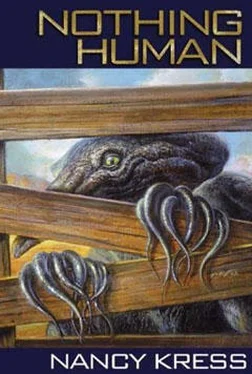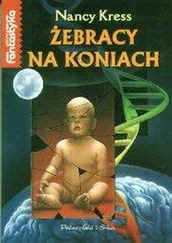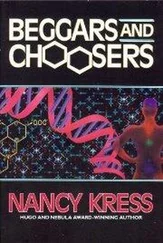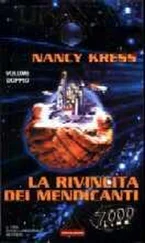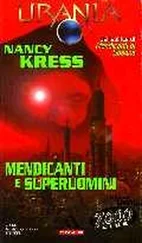A school was finally organized. Lillie resumed algebra.
A few more parents left, forced out by the pressures of ordinary life. Keith had begun spending his free time, of which he had too much, with a psychologist divorcee from Connecticut. Her son was part of the bunch of kids Lillie hung around with. She was warm and funny and pretty, but both of them recognized that the surreal circumstances permitted nothing real to develop between them.
The day she left to go home, she came by the bungalow to say goodbye. “I’ve left my other son with his father too long, Keith. That bastard’s not fit to take care of a gerbil, and Lenny’s only seven. David is thirteen, he can fend for himself better, and this place cushions the kids more effectively than I’d dare hope.”
“I’ll keep an eye on him, Jenna.”
“Thank you. I hoped you say that. You know…”
“What?”
She smiled wanly. “Anna Freud said something once about motherhood. She said, ‘A mother’s role is to be left.’ I believe that. But not like this, Keith. Not like this.”
He kissed her regretfully, not contradicting.
That night one of the doctors—there were so many that he had trouble keeping them straight—made a formal call on Keith. Lillie was at a basketball game at the youth center.
“Mr. Anderson, we’d like your permission to do an experiment with Lillie.”
“An experiment on Lillie?”
“Not ‘on’—‘with.’ We asked for volunteers and Lillie immediately raised her hand, but of course we wouldn’t go forward without your consent.”
Keith didn’t like this. Why was Lillie such an adventurer? He said warily, “Go ahead.”
“You realize, of course, that the pribir’s communication with the children is one-way. They supply inhalant molecules that—”
“Have you captured any of those molecules?” Keith asked. Might as well take advantage of temporarily being sought after.
The doctor hesitated. “Well, no. Olfactory molecules must be dissolved in the lipids in the nose in order to be smelled, so after inhalation they don’t last long.”
“I see.”
“The pribir supply information to the children through the molecules, but there’s no way for the kids to supply information back. They’re just receptors.”
Keith didn’t much like this description of Lillie, but he nodded.
“What we’d like to do is take Lillie, and three others, into a negative-pressure room for two days. Air cannot come in from the outside. We want to see if they draw anything, if any drawings still match the kids’ outside. Also, see what changes occur in her neural firing patterns.”
Keith thought it over. “The things you do to her will be noninvasive?”
“Absolutely.”
“Then if Lillie wants to go, I’ll give my consent.” It couldn’t hurt to have her out of the pribir’s olfactory clutches for a while.
“Good. Thank you,” the doctor said. “We’re not publicizing this test, by the way.”
“I understand,” Keith said.
Lillie and two other children disappeared for two and a half days. Theresa wasn’t one of them. In the negative-pressure building, the test subjects drew nothing. Neural activity in Lillie’s “anomalous brain area” subsided to nearly quiescent. The children on the outside produced three drawings.
“I’m glad that’s done,” Lillie told Keith, Theresa, and Carlo when she returned. “It was boring. And I missed the pribir.”
“Of course you did,” Theresa said.
The media (and probably the FBI) had torn apart the life of Timothy Allen Miller. Reporters found huge numbers of irrelevant details, and no further information than Jamal had about why Miller had been selected by the pribir to create the “pribir children,” or how, or to what ultimate end. Depending on the channel, Miller was portrayed as a monster, a traitor, an egomaniac, or a Christ figure. The last came about because the pribir genetic construct derived from Sertoli cells did indeed prove to cure all cancers, all the time.
More drawings, and more genetic knowledge, followed over the next few months. Sometimes a concept took twenty drawings to clarify; apparently cancer had been an easy problem. Huntington’s chorea, that terrible loss of brain cells leading to dementia and death, came with a person’s genes. The pribir sent detailed directions for how to keep affected brain cells from disintegrating. It involved, as Keith understood it, stimuli to switch on genes that switched other genes on or off that affected more genes making different proteins… He couldn’t follow the details. The effect was that those genetically fated to get Huntington’s would not get it at all.
They identified and rectified the complex chemical imbalance responsible for schizophrenia.
They gave instructions for the Holy Grail of tropical medicine, an immunity to malaria. The World Health Organization set about preparing to save a million lives every year.
“I’ll tell you what bothers me about the pribir,” Dennis Reeder said to Keith. Reeder was preparing to move back home and resume his medical practice. Hannah, like a growing number of the other “pribir children,” would live in a supervised dormitory at Andrews. For Hannah’s safety or the medicos’ convenience? Probably both.
“What bothers you about the pribir?” Keith asked. A lot about them still bothered him.
“If they wanted to give all these ‘genetic gifts’ to humanity, and if they did once have Timothy Miller upstairs on some craft to engineer our kids, then why not just give the ‘gifts’ directly to Miller? He was a geneticist, he would have understood what he was looking at a hell of a lot better than Hannah does.”
“I don’t know,” Keith said.
“It makes me wonder what else the pribir have in store for our children.”
Keith didn’t answer.
“Are you going home, too, Anderson? You must have a law practice begging for your return.”
“Not exactly.” He could have gone back, of course. But by now, after months away, his cases had all been reassigned to other attorneys, just as if Keith had died. And for reasons he couldn’t explain, reasons connected somehow to his guilt about Barbara, he couldn’t leave Lillie.
“Uncle Keith,” she said shyly a few weeks later, “do you mind if I move to the dorm with the other girls? Not that I don’t love living here with you,” she added hastily, “but all my friends are already in the dorm, Emily and Madison and Julie, and Tess and I are missing stuff.”
He looked at her hopeful face. How quickly the young could transplant their lives. He remembered doing it himself: for college, for law school, for the job in New York. “No, honey. I don’t mind.”
“You could stay on base. I’m sure they’d let you.” She glanced doubtfully around the three-bedroom bungalow, empty of the Romeroes. “Maybe in a smaller place.”
“I’ll see.”
The Andrews Housing Office assigned him a one-bedroom house across Perimeter Road from the Malcolm Grow Medical Center. He gathered that he was an exception; usually “unaccompanied military personnel” lived in a dormitory and civilian personnel lived off base. Keith knew his life was an exception long before the Housing Office told him so.
He saw Lillie every day, read a lot, hung around Malcolm Grow to learn what he could. The doctor assigned to Lillie, a woman in her sixties named Elena Rice, decided that Keith was both trustworthy and needy. She kept him accurately informed about the information the children were receiving and about medicine’s attempts to put it to use.
The media were not accurately informed. Inflated stories spread like the infectious diseases the pribir were curing. The children had been told the secret of immortality. The children had been taught to levitate, to fly, to master telekinesis, to communicate by ESP. The pribir were going to land tomorrow, next week, when humanity had been all remade in their image. The pribir were already here, disguised as humans. The pribir had already left and a mad genius was giving the children the genetic gifts, just before he destroyed us all with a horrific plague.
Читать дальше
